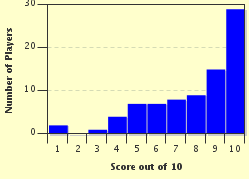Quiz Answer Key and Fun Facts
1. Led by Jomo Kenyatta, which African nation gained its freedom from Britain on December 12, 1963?
2. Named by Portuguese explorer Pedro de Sintra in 1462, this country gained its independence in 1961. In the 18th Century, the British resettled a couple thousand former slaves here in what was called the "Province of Freedom." Similar efforts continued in the next century and included a settlement named Freetown, which is now this nation's capital. Which West African country is it?
3. Eleven of the first 15 African countries to become independent in the period 1961 to 1968 did so from the United Kingdom. On July 1, 1962, two countries gained freedom from Belgium. One of these has its capital at Bujumbura, on the shores of Lake Tanganyika. Which of the following is it?
4. Famous for a former inhabitant, now extinct, this nation (which gained freedom from Britain on March 12, 1968), was owned by the Dutch from 1638 to 1710 and by the French from 1715 to 1810. Which African nation is this that has no official language (although English is official in Parliament), has its own distinctive music genre called sega, and is the 179th-largest nation in the world?
5. Among the world's least developed countries, this African nation gained its freedom from Britain on July 6, 1964. Which country is this that was formerly known as Nyasaland and has its capital at Lilongwe?
6. Which French colony, the largest African nation to gain its independence between 1961 and 1968, became a free nation on July 2, 1962?
7. This country, with a flag sporting a large black-and-white African shield on a broad horizontal red band, gained its independence from Britain on September 6, 1968. Which small, land-locked nation in southern Africa was declared an absolute monarchy in 1973 by King Sobhuza II?
8. In 1855, David Livingstone was the first European to see the magnificent waterfalls, which he named Victoria Falls, on the river this nation is named for. But before it became free of the UK on October 24, 1964, it bore the name of the British businessman who dominated the British colonies of southern Africa at the end of the Nineteenth Century. Which kidney-shaped nation is this, whose capital is Lusaka?
9. The last African country to gain its independence in the 1960s was not a British colony at the time. The only African country with Spanish as its official language (it gained independence from Spain on October 12, 1968), it also recognizes French and Portuguese as official. Which small state is this, whose capital, Malabo, lies on an island called Bioko?
10. Once known as Bechuanaland, this nation's geography is dominated by the Kalahari Desert. After becoming independent from the United Kingdom on September 30, 1966, it changed its name to the word its citizens use to refer to themselves, which also reflects the country's most widely spoken language. Which nation is this, whose capital is Gaborone?
Source: Author
shvdotr
This quiz was reviewed by FunTrivia editor
gtho4 before going online.
Any errors found in FunTrivia content are routinely corrected through our feedback system.

